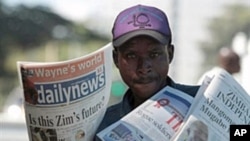Zimbabwe’s Daily News is back on the streets after a seven-year absence. The newspaper was forced to close after marathon court battles under the former government controlled by the ZANU-PF party.
Many Harare residents seemed pleased to have another newspaper choice.
Happy readers
Jill Day is Zimbabwe’s senior public relations consultant, who has long contributed to media debate. She said she welcomed the return of the Daily News. She said looking at the first edition of the returned Daily News had given her pleasure.
"The Daily News is great. It has business on business pages, not politics, it’s got stories on arts pages no one else has written about, and a couple of really hard news political stories. It’s fantastic to have a newspaper you really want to read and don't read out of a sense of duty."
The Daily News came into being after decades of domination by the pro ZANU-PF Zimbabwe Newspapers group, which produced two dailies, the Herald in Harare and the Chronicle in second city Bulawayo.
Newspaper's debut and revelations
The Daily News arrived with the birth of the new political party the Movement for Democratic Change and largely supported the party lead by former trade unionist Morgan Tsvangirai, now prime minister of Zimbabwe, in a troubled two-year-old inclusive government.
As repression grew alongside the popularity of the MDC, the ZANU-PF information ministry targeted the Daily News. Most of its journalists were arrested at one time or another. Some had to flee the country, and its printing press was destroyed by a massive bomb.
Helped by another privately owned newspaper group, it carried on publishing.
The Daily News revealed many atrocities allegedly committed by Zimbabwe President Robert Mugabe’s supporters and exposed new information about the security forces, as well as investigations on looting of state assets by several politicians.
Repressive court battles
Finally, as media laws tightened, the Daily News went to court to resist seeking accreditation with the new ZANU-PF-controlled media commission. Eventually, in 2003, it lost its case in the Supreme Court and had to close its doors.
Several more small newspapers were forced to close down, and Zimbabwe was left with three privately funded weeklies and the pro ZANU-PF dailies.
The only electronic media remains the highly partisan Zimbabwe Broadcasting Corporation.
The Media Monitoring Project of Zimbabwe says the ZBC is now even more partisan than it was before the inclusive government came to power and comes close, almost on a daily basis, to publishing hate speech.
Partisan broadcasting
The only four radio stations and two TV channels openly support the ZANU-PF party and Mugabe, and run party jingles day and night.
The monitors says ZBC largely carries stories which denigrate Tsvangirai and the MDC party.
Since the inclusive government came to power, a new privately owned daily,Newsday , has emerged and has quickly become popular, while not automatically supporting the MDC.
Healthy competition
The re-appearance Friday of the Daily News on Harare’s streets made many people happy. Souvenir first editions sold in central Harare swiftly.
Now there is competition between three daily papers, The pro ZANU-PF Herald, Newsday and the Daily News.
Stephen Chapisa, a messenger for a small Harare company, lives in a densely packed township east of the city center. He said he did not believe it when he heard the Daily News was returning.
"To me, I am really amazed... people are not going to manage to buy all the papers. People are going to choose the paper which has got the great news, like this Daily News, perfect. The Herald is just talking of Mugabe only," said Chapisa.
Although the broadcast media in Zimbabwe remains firmly within ZANU-PF’s control, most Zimbabwe journalists say they now can easily secure accreditation.
A handful of journalists have been briefly arrested since the inclusive government emerged, and many say they remain wary that the freedoms they now enjoy could disappear if the political temperature continues to heat up.
Zimbabwe’s Popular Newspaper Returns After Seven Years




